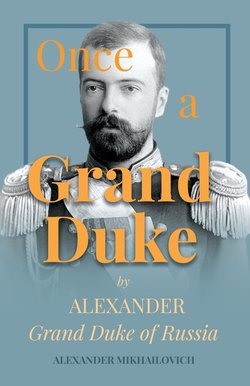Читать книгу Once A Grand Duke by Alexander Grand Duke of Russia - Alexander Mikhailovich - Страница 14
На сайте Литреса книга снята с продажи.
3
ОглавлениеA week later father left for the front. We envied him and could not sympathize with the sorrow of our sobbing mother. We were so proud to see him seated in an especially built large carriage, drawn by four horses, with six Cossacks galloping behind, and three Cossacks in front, one of them carrying the banner of the viceroy, bearing a Greek Orthodox cross on a white background in a frame of black and orange stripes, with an inscription “God Save and Protect” embroidered all over it and a massive bronze cross attached to the end of the pole. Innumerable carriages with generals and members of the staff followed right after, escorted by a squadron of Guard-Cossacks. The solemn bars of the Russian National Anthem and the frantic hurrahs of the population created a martial atmosphere. We could not think of returning to the routine of daily lessons. We wanted to talk war. We discussed the possibility of fighting continuing for several years, in which case we all would be given an opportunity to join our father.
Each morning brought something exceedingly exciting.
The Caucasian Army captured a Turkish fortress.
The Danube Army, commanded by our uncle Nicholas, crossed that great river and headed for Plevna, where the bitterest battles of the war were to be fought.
The Emperor visited Headquarters distributing decorations to numerous officers, all of them well known to us.
The first party of Turkish prisoners arrived in Tiflis.
The names of several of my father’s assistants, principally that of General Loris-Melikoff, were being repeated every minute.
It was fascinating to realize that all these good friends of ours had suddenly become great national heroes. It was a joy to witness the departure of our military tutor, called to the colors shortly after the declaration of war, and the subsequent slackening of the relentless discipline dominating our education. Awful as this confession may sound, I did wish that a helpful Turkish bullet should spare us the necessity of ever seeing this ferocious man again. Fortunately for the future peace of my mind, he came back unscathed and highly decorated, although his place in the palace was by that time taken over by a tutor of milder disposition.
A regular service of special messengers established between the palace and the headquarters of our father in Alexandropol kept us in close touch with the latest events on the front, and the arrival of the daily army communiqué provided a signal for rushing toward the relief map and moving the flags indicating the positions of our army. The communiqué spared no colors in describing the achievements of our army; it usually mentioned the number of the Turks killed, wounded, and captured,—and these figures sounded like sweet music to our ears. Many years later, while in command of the Imperial Air Forces during the World War, I learned the curious mechanism directing the editing of the official communiqués and wished I could revive the gullibility of the eleven-year-old enthusiast, who watched with shining eyes the progress of the Russian Army through Turkey, not realizing the size of the human hecatombs it was leaving in its wake. In 1914-1917 I discovered that the “heavy losses” sustained by the “rapidly retreating enemy” were invariably accompanied by still heavier losses of our “glorious advancing troops.” I suppose nothing will ever change the repertory of euphemisms used by the authors of military communiqués, nor their beastly habit of gloating over the gloomy sight of corpses found in the captured trenches. To the contrary, it has to be frankly admitted that the ethics of warfare have undergone a considerable change within the last forty years. Even that sufficiently thin veneer of chivalry which was still noticeable in 1877 and 1878 gave way to guerrilla-like methods by the time proud humanity had decided to bury 400,000 of its sons around the city of Verdun. Reading the reports describing the foul conditions prevailing in the prisoners’ camps during the World War, I always thought of the refreshing sympathy and consideration with which the Turkish prisoners were treated by us in 1877. Emperor Alexander II thought it advisable to grant a personal audience to Osman-Pasha, the famous commander of the captured Turkish fortress Plevna; he returned him his sword and praised his courage and military genius in high terms. So much for the pre-the-Tribunal-of-The-Hague days. Thirty-seven years later, General Korniloff, when imprisoned by the Austrians in the Carpathians, was given a reception usually reserved for petty thieves and common criminals.
